The Man Who Lived Again 1936
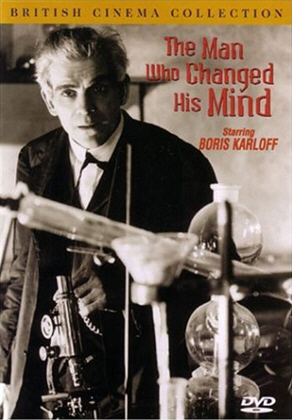
"I shall show you lot strange things about the heed of man…"
[aka The Homo Who Lived Again aka The Brainsnatcher aka Body Switch aka Dr Maniac]
Manager: Robert Stevenson
Starring: Boris Karloff, Anna Lee, John Loder, Frank Cellier, Donald Calthrop, Cecil Parker, Lynn Harding
Screenplay: L. du Garde Peach, John L. Balderston and Sidney Gilliat
Synopsis: To the dismay of her colleagues, Dr Clare Wyatt (Anna Lee) resigns her position as a surgeon in a London infirmary to take up a inquiry post, working with the brain adept, Dr Laurience (Boris Karloff). Dr Gratton (Cecil Parker) warns her that Laurience is no longer the man she trained under, simply has since caused a strange reputation. Clare is adamant, however, and remains and then in confront of pleading from reporter Dick Haslewood (John Loder), who wants her to marry him. Dick likewise has learned some odd things almost Laurience, including his claim that he is, "Discovering the human soul." Clare is unperturbed, and sets out for the isolated state house in which Laurience has ready his laboratory. She is perturbed, yet, when she arrives at the nearest station to find Dick there earlier her: he tells her that he has persuaded his editor there is a story in Laurience. Clare shakes him off and takes a horse-drawn cab to Laurience'southward house—only for the reluctant cabbie to driblet her some altitude abroad. She is admitted to the business firm by an annoying private in a wheelchair called Clayton (Donald Calthrop), who brusquely directs her to the laboratory. Clare is delighted to be reunited with her mentor, but dismayed to find him so changed. Laurience speaks bitterly of his past reputation as a leading surgeon and an potency on the brain—and of his rejection by the European scientific community, which considered his ideas likewise outrageous. He tells Clare that he wants her as his assistant, in spite of her lack of research feel, because of the enthusiasm and courage she displayed every bit his pupil. Clare promises Laurience that she will follow him without fear… That night, after Clare has gone to bed, she is startled by the audio of stones hitting her window—but not surprised to find Dick down beneath. He climbs up the ivied trellis, telling Clare what he has learned: that Laurience has a sinister reputation in the hamlet, and that no servant volition stay in the house. He tells Clare that he volition be staying at the hamlet inn, and she agrees to ship for him if anything goes incorrect. The following morning Clare receives farther discouragement from Clayton, who jeers at her contention that she understands Laurience. Meanwhile, Dick has filed an inflammatory story about the scientist. When he learns that Laurience will non see this deliberate provocation, every bit he does non take the paper, Dick makes a bespeak of carrying a copy up to the firm. A horrified Clare intercepts it, simply Clayton shows the article to Laurience; indignantly denying that he had anything to practise with it. Back in London, Lord Haslewood (Frank Cellier), the owner of the paper – and Dick'southward father – criticises his editors for not making the story more prominent. Not simply does Lord Haslewood believe that science is news, he has founded a research institute to ensure that any new developments will be his holding, and reported first in his papers. He decides to meet and talk with Laurience himself. Meanwhile, Laurience reveals to Clare the nature of his research. He argues that the simply difference between a living brain and a dead one is that the latter has had its idea-content removed; and that, in his belief, information technology is possible non only to extract and store that content, but to transfer thoughts – in effect, a personality – from one encephalon to some other…
Comments: Afterwards establishing himself in Frankenstein in 1931, Boris Karloff cemented his reputation as a horror star across 1932 via a trio of films – and finer four roles – that allowed him to display his range: as the sinister mute butler, Morgan, in James Whale's The Old Dark Business firm; the title grapheme in The Mask Of Fu Manchu; and as both the bandaged-swathed monster and his seemingly human incarnation in The Mummy.
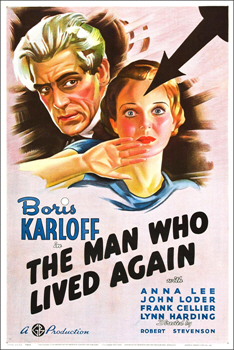
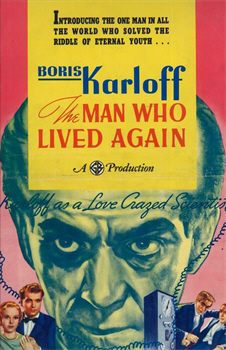
Having reached this meridian and so swiftly, afterward so many years of struggle, Karloff then showed unusual shrewdness in his subsequent direction of his career—at least during the horror boom of the 1930s. While always staying loyal to Universal, and returning to the studio at regular intervals, Karloff negotiated contracts that allowed him to remain independent and to pick and choose his roles—and to motility as he liked between Hollywood and Great britain.
However, in the mid-30s, the boom began to wane—not least because of the British censorial crackdown on screen horror, which dissuaded the American studios from continuing to invest heavily in the genre. From 1936 onwards, two things happened simultaneously: there was a shift from horror to scientific discipline fiction; and budgets began to compress. Together, these forces produced a rush of low-budget "mad scientist" dramas—an astonishing proportion of which starred Boris Karloff. It is likely that, declining to predict his own ongoing bankability – let alone that he would still exist working regularly some three decades later – Karloff was determined to take financial advantage of what he may take viewed as his last significant professional opportunity.
Karloff is the best affair about the bulk of these films; but if none of them are neat, nearly of them are interesting—particularly in their recurrent apply of their star, whose characters are usually not outright "mad" and then much equally over-reachers, whose good intentions invariably lead them down the traditional road.
Most of these science-fiction quickies were churned out in America; but 1936 constitute Boris back in Britain making ane of the most entertaining of the unabridged clutch—one in which he is (in picture terms) quite indisputably mad…
With but just over an hour at its disposal, The Man Who Changed His Mind has no time to waste matter; and information technology introduces us immediately to i of its most important aspects, its female atomic number 82.
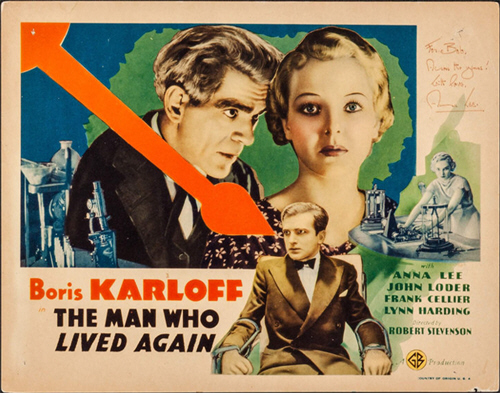
Information technology is interesting to debate how we are supposed to have Dr Clare Wyatt. Though she is fix as this era's anathema, a "potent-minded adult female" (she's even called that!), and though her collaboration with Dr Laurience ends in tears, and then that you can if you lot choose read this as even so another parable of the inevitable consequences of women stepping out of their "proper" sphere, it doesn't seem to me that at that place's whatsoever existent sense of condemnation in the way the film handles her. On the contrary, first and terminal – literally commencement and last – it shows her in command in a enervating situation, and finally pulling off the kind of rescue unremarkably reserved for "the hero".
In that location's no doubt, though, that The Man Who Changed His Heed intends to surprise the viewer, when one of the gowned and masked surgeons seen leaving an operating-theatre is revealed as a woman. Clare's older colleague, Dr Gratton, bemoans her conclusion to leave surgery for research, and as well warns her that Dr Laurience – pronounced "Lorenz" – is not the same human being she knew when she was training under him: that they "threw him out" of Genoa, for his "impossible ideas".
Gratton and some other medico condemn Laurience as "mad", "unorthodox" and "queer"; Clare counters with "eccentric", "vivid" and "genius".
Clare's packing is interrupted by Dick Haslewood, who has also come to warn her against Laurience; although he is motivated by self-interest, in that he wants Clare to marry him.
This cliché state of affairs is handled quite lightly, though, in spite of the standard entitled harassment that insists that, no matter how much time and effort a woman has put into getting qualified and establishing herself professionally, she should just chuck information technology all away the moment a man looks at her; and once again, there's no overt sign nosotros're supposed to side with Dick: his response to her insistence that firstly, she must do her chore, and secondly, that's she's used to looking after herself – you guessed information technology: "How I hate strong-minded women!" – is treated basically as a joke.
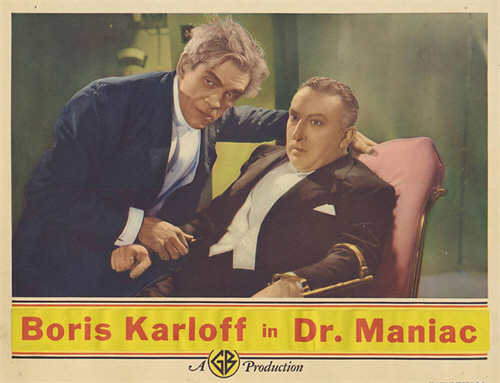
Dick wasn't kidding, though, when he threatened to follow Clare to Laurience'southward business firm: she finds him at the nearest station when she arrives, having caught an earlier train; though his official excuse is that he has been commissioned to interview Laurience. Clare manages to go out him behind, and is driven to the house in the pocket-size village's i horse-drawn cab; or at least, almost to the house: she gets the Borgo Pass treatment from the cabbie, who informs her tartly that, "I don't become to that door."
Clare's reception at the business firm itself is no more encouraging: she is admitted past a man in a wheelchair called Clayton, who introduces himself as, "Ane of the physician'due south more hopeless cases." Every bit Clare runs an instinctive professional eye over him, Clayton points to his head and announces, "Intercranial cyst", adding that, yes, he should be expressionless—and that in fact, near of him is. He directs her brusquely to the laboratory.
Nosotros must be careful how we interpret the character of Clayton, who is the source of virtually of the film's overt humour via an almost-abiding stream of sarcastic misanthropy—only who isn't just here to exist funny. These early on, mouthy scenes establish his idiosyncratic and annoying personality.
Likewise, we must refrain from flinching every time we cut to Laurience and find him smoking in his laboratory…
{*shudder*}
On the other mitt, Laurience's private laboratory is some other of the movie's modest pleasures, an agreeable mix of the usual retorts and bubbles flasks with some less explicable electronic hardware. These gadgets and glassware are well-nigh enough to keep u.s. from noticing that the movie offers non the slightest hint as how Laurience really achieves his goals; almost.
Clare and her onetime mentor share a warm greeting, just almost immediately Clare reacts with dismay to how much Laurience has changed since she concluding saw him, how much he has aged.
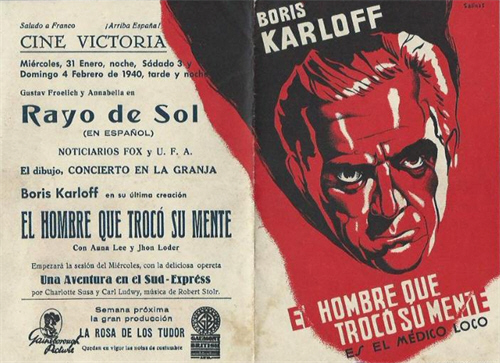
As I say—this isn't a pic with much time to waste, and instead of fugitive the outcome at all, Laurience instantly launches into bitter speech:
Laurience: "I am inverse! The leading surgeon in Genoa; the greatest potency on the human brain—until I told them something well-nigh their own brains! Then they said I was mad!"
You guessed it, folks: The Homo Who Changed His Mind is a bear witness-the-fools-wrong film; and nosotros all know how well that usually works out, right?
Clare questions Laurience over her own position, pointing out cocky-deprecatingly that he could have hired a far more than experienced scientist than herself as his assistant. Laurience replies passionately that he didn't desire experience, someone whose "heed is set": he wanted the courage and the faith in the work that he remembered from Clare'due south days every bit a young student. Laurience and so warns Clare that he shall show her some strange things, but adds that she must follow him without fear. Fired by his enthusiasm, she promises to practice so.
Later Clare has gone to bed, Laurience confronts Clayton, who admits frankly that he doesn't like women, and doesn't want her in the business firm:
Laurience: "Simply she's a scientist!"
Clayton: "A female person scientist!? All tears and hysterics and can't proceed a secret!"
Laurience insists that Clare wants to piece of work with him, and that she is going to—admitting, notwithstanding, that he has not nonetheless fully explained the nature of that piece of work to her. Clayton urges him to do so, adding satirically, "Perhaps she will change her mind!"
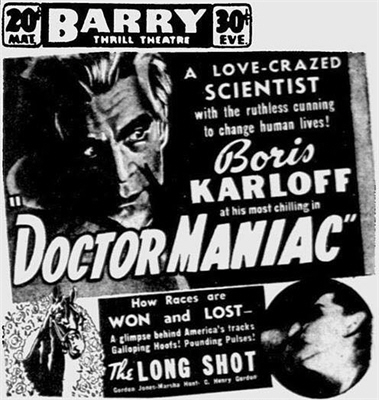
Meanwhile, Clare is perched on her own windowsill having a conversation with Dick, who tells her what he has learned in the village about Laurience and his household. He responds inadvertently to Clare's insistence that he become away, plunging to the ground when the trellis collapses nether him, and hiding in the bushes went a suspicious Laurience appears at the front door and shines a torch around. Clare is amused past this, but startled when Laurience comes knocking at her door, asking about voices. However, he accepts her hurried denial.
Clare earns another dose of sarcasm from Clayton the next morning when she sets about washing up—not the dishes: given the accumulation, that'due south a task across any woman—but the coffee-pot. He continues to nag at her, accusing her of disliking him every bit much every bit he dislikes her, and jeers at her assertion that she understands Laurience.
Up at the village inn, Dick is admiring the morning edition of the Daily Gazette, which carries his own inflammatory story on Laurience. Learning that they don't accept the paper up at "the manor", Dick makes a point of delivering a re-create. Clare is pleased to see him, simply horrified at his handiwork, which she conceals from Laurience. (We note that Dick spells it "Lorenz": did they, ahem, alter their minds, or does this reverberate Dick'due south lack of professionalism?) Clayton makes a point of bringing information technology to his detect, withal, only to exist accused of being the source. Laurience reminds Clayton angrily that simply he is keeping him alive; and if he were to miss one injection…
Clayton: "I don't mind dying; but to be defendant of journalism…!"
This remark properly introduces the main subplot of The Man Who Inverse His Mind, in which the press – and perhaps more than correctly, press barons – have a chirapsia. Alas! – would we could say that much has changed in this respect since 1936.
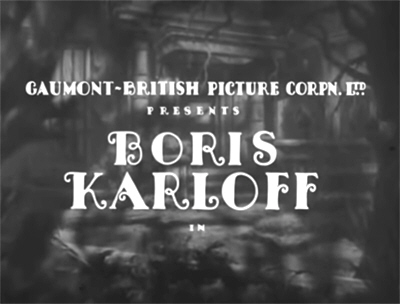
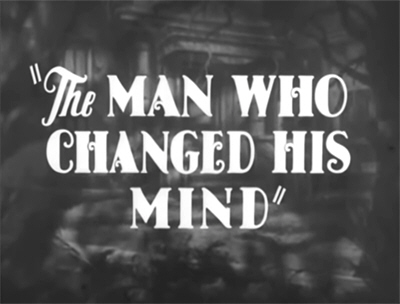
The motion picture has a great deal of satirical fun with the character of Lord Haslewood, who makes his editors' lives miserable via his, ahem, strictly hands-off direction fashion:
Editor #one: "If you say so…"
Haslewood: "I don't say so: information technology's a fact!"
Editor #two: "Just I have other views—"
Haslewood: "At that place are no other views!"
Editor #2: "Then what practice you desire united states to do?"
Haslewood: "Nil! Not a thing. You know I never interfere in the comport of my papers…"
The point of contention this fourth dimension is Laurience—and not just because it is Dick who has filed a story on him. Dick himself, by the way, is also made the object of the film's satire: his story is a complete faux, a beat-up constructed out of village gossip but posing as an interview with Laurience: something that volition later come up dorsum to bite him (although non as hard as it should, presumably out of deference to his position of putative romantic lead).
The ensuing argument with his editors reveals that Haslewood has founded a scientific research constitute out of his belief that "scientific discipline", these days, is news – "If properly handled, front end-page news!" In this mode, the Haslewood papers get full do good of anything produced past the Haslewood Institute—
—a state of affairs which rather delightfully illustrates one of the about cherished, and tenacious, beliefs of the science-fiction film: that Scientific discipline!! is something that happens by way of sudden DISCOVERY!!, rather than via years of painstaking, step-by-pace progress.
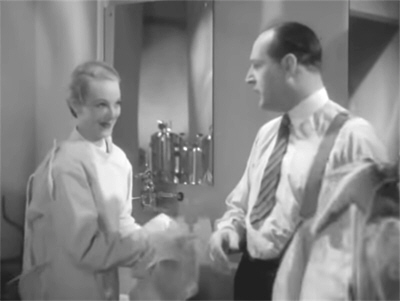
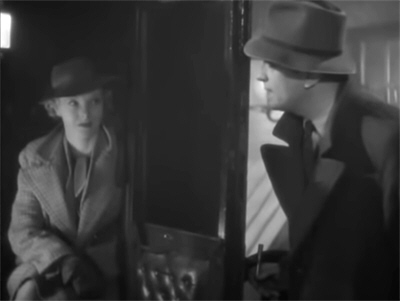
The issue of Lord Haslewood'south argument with his editors is his decision to run across Laurience for himself, and recruit him for his Institute.
Meanwhile, Laurience is easing Clare into the nature of his inquiry, explaining to her his theory that the simply deviation between a alive encephalon and a dead brain is that the latter has been "wiped", the thought-content, the personality, the mind removed. He goes on to affirm his belief that there may be a mode of actively extracting the thought-content from a living brain, and to store it – "Every bit you lot would store electricity" – leaving the brain itself alive but empty.
Moreover, Laurience is in a position to evidence his theory. He introduces an experimental chimp, a gentle, friendly and affectionate animal, which has been trained to sit on one side of what looks worryingly like a two-for-ane electric chair, and to don a helmet sporting a range of electrodes, from which wires run to 1 of Laurience's electronic doo-hickeys.
"You see, he likes it. To him it's but like falling comatose," comments Laurience (a line I have no doubt was included to placate the British censors, who were always touchy about the treatment of animals in films, and rightly and then).
Laurience and then sets his doo-hickey in movement: its moving parts go upward and down, electronic whining fills the air, and a Van der Graaff generator springs to life. The stop-bespeak of the process is, nosotros gather, a kind of storage container, which begins to glow as Laurience works his equipment.
SCIENCE!!
To Laurience'due south contention that the mind of the chimp has been tuckered, and is now in storage, Clare demands to know how he tin can evidence it: the chimp, unconscious in its seat, might simply be asleep or anaesthetised. When she agrees that placing the chimp'south drained listen into a second fauna would prove information technology, Laurience tells her that for the start time, he intends to make the attempt. He introduces a second chimp, this ane ambitious and dangerous.
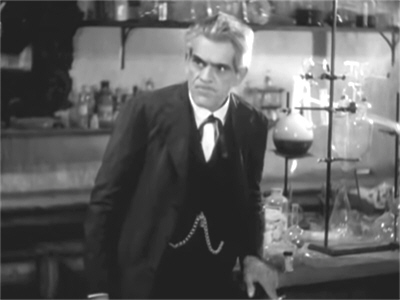
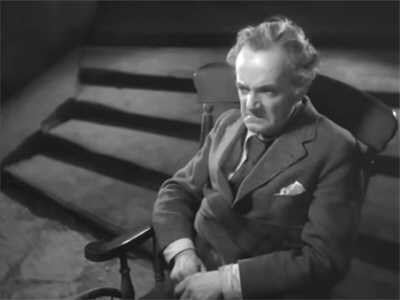
(Since the plot requires this animal to resist, and to exist forced into its seat, nearly of this takes identify off-photographic camera, with chimp-shrieks dubbed in.)
Laurience goes through the same procedure with the 2nd chimp, draining its heed into a second storage battery. He then attempts to place the mind of the offset chimp into the encephalon of the second i—effectively by – say it with me, at present! – reversing the polarity.
In one case done, Laurience releases the second chimp, which is now conscious. Information technology immediately displays a completely unlike temperament—and that it knows which pocket Laurience keeps his chimp-treats in. The scientist and then releases the outset chimp—which shrieks and snarls.
An excited Laurience insists that this proves his theory: that the mind of each animal has been transferred into the other—its personality, its likes and dislikes—what, if they were human beings, would be called "the soul"…
Clare's protest is firsthand and vehement, prompting Laurience to agree that she is right, of grade: he can't exercise that…
Dick is on the verge of departing the village inn when his father arrives. He is gratified to win praise from Lord Haslewood for his work, but dismayed when his father asks for an introduction to Laurience. He resorts to some fast talking, insisting that no introduction is necessary, that Laurience must know him every bit the founder of the prestigious Haslewood Constitute.
Lord Haslewood swallows this and sets off for the manor, where Laurience receives him with hostility as a representative of the press—pre-emptively rejecting any offer that Haslewood might make him with a frosty, "I am non for auction!"—
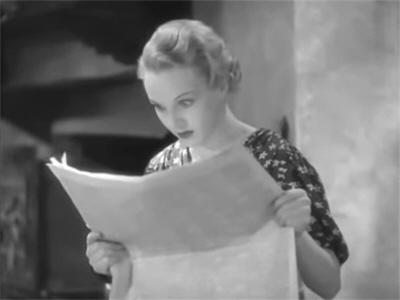
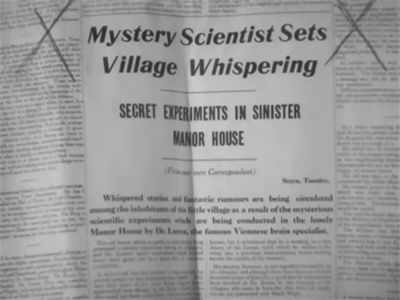
—although as it turns out, this isn't strictly true; but we tin can hardly blame him, when Lord Haslewood offers him carte blanche in terms of facilities and resources for his work, in exchange for the Haslewood papers having sectional rights to his discoveries—or rather, DISCOVERIES!! Even and so, Laurience hesitates—insisting that he must accept freedom to piece of work in his ain way. However, when Clare urges him to accept the offer, he capitulates.
And this, in its manner – and despite its clinging to various other motion-picture show misconceptions – is one of the most interesting things about The Homo Who Changed His Mind: it is that rare scientific discipline-fiction film, certainly of this era, non only to present the states with an actual research facility, but to make a plot-point out of the funding of research, and the consequences of that funding; as well as arguing for all the advantages of not working out of your own basement. (Not that it'due south a literal basement in this instance, but you know what I hateful.) That said, of course it all goes horribly wrong for Laurience once he's thrown in his lot with Lord Haslewood, so I'm not entirely sure what the takeaway bulletin might exist.
Haslewood then sets to work publicising his new venture—with the front page of the Gazette given over to Laurience's new position at the Haslewood Institute. Every possible form of advertising is devoted to boastful references to "the brain genius", from basic placards on walls to posters in trains to trailing signs in the sky. Dismissing his editors' concerns nigh the crassness of his approach – he prefers the term "simplicity" – Lord Haslewood unveils his plan to brand Laurience a household word:
Editor #i: "But no-one knows what he's washed!"
Editor #2: "No-one knows if he'south any good!"
Haslewood: "I flatter myself I know genius when I meet it!"
And so certain is he, Haslewood arranges for a gathering of "the scientific community", then that Laurience tin can explain his theories.
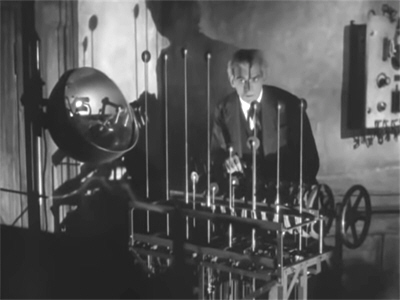
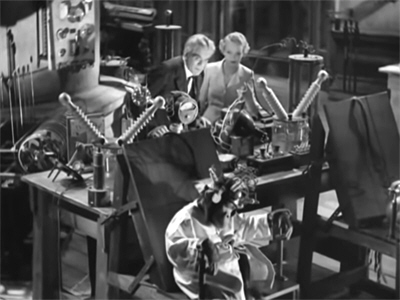
Dick is unimpressed by his glimpse of SCIENCE!! en masse, putting Clare on the professional defensive. She gets ane of her well-nigh endearing moments hither as, despite being both a doctor and a surgeon, she insists upon – to coin a phrase – calling herself a scientist:
Clare: "One of these days you'll be proud to know me."
Dick: "Wouldn't you rather ally me instead?"
Clare: "Definitely non!"
Hither The Man Who Inverse His Listen delivers on still another on the science-fiction flick's favourite conventions, the notion that scientists regularly become together for the limited purpose of gasping and mocking and ultimately driving one of their number out of their midst: a form of public shaming which, we must note with some bemusement, this community persists with despite the fact that the invariable outcome is a loss of mental balance, a determination to show the fools incorrect and, by and large, a body count…
(In reality the bones process happens, of course, merely in a much quieter if no less effective way: they only don't publish you.)
And having been driven out of Genoa for his "impossible ideas", Laurience finds the English scientific customs no less hide-bound and hostile, every bit he is literally hooted off the stage when he tries to expound upon his mind-swap theory. Led past the pompous Professor Holloway – a long-term critic of Lord Haslewood's proceedings, we gather – the scientists walk out without giving Laurience even the barest take chances to explain his experiments or how he drew his conclusions.
(The notion that a group of scientists, whatever they thought of an thought in general, wouldn't desire to stick effectually to hear how a radical experiment was conducted, is of grade quite absurd.)
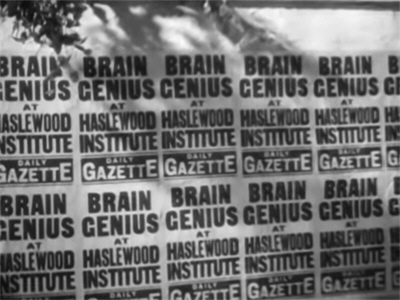
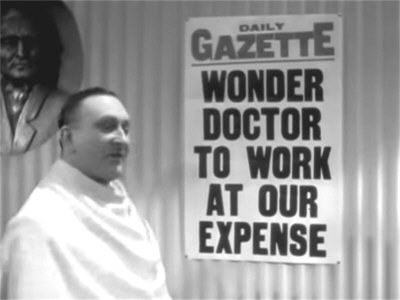
Every bit his audience files by him, Laurience explodes in anger—giving the first overt indication of the direction in which he intends to take his research, as he speaks of transferring minds from "miserable, bent bodies" into bodies that are "young and strong". He as well sums up the departing in two words: "You fools!"
Mind you— Laurience might take a signal when he talks about his colleagues' "death-beds": during the file-out, nosotros notation that Clare seems to be the only scientist in England who is (i) female, and (ii) under the age of 50.
These days, however, the implications of Laurience'due south experiments cause me fifty-fifty more than manic glee than they did when I first saw this film, because I am now in a position to appreciate that what we take here is effectively a anemic version of Dr Obrero'southward encephalon-swap experiments from Zombi Holocaust—to which exactly the aforementioned objection may be made, i.e. for all the talk of "the mutual good"", it's impossible to overlook the fact that, in each individual experiment, one person is doomed to go the fuzzy end of the lollipop.
(I suppose you could envisage a situation where the bodies of the brain-dead might be donated; but it's hard non to further imagine the very rich getting commencement dibs, rather than the but "deserving"…)
Clare hurries to Laurience, whom she finds in his laboratory setting upwards an experiment—which he intends to acquit on himself. She is horrified, insisting that, "Your listen is sacred", and flatly refuses to help him.
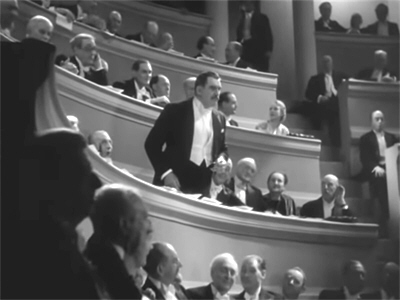
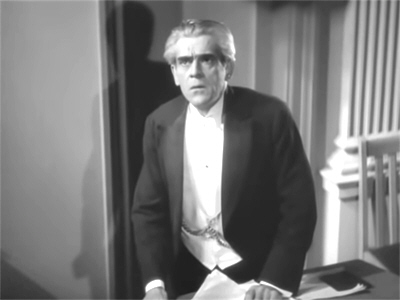
They are still arguing the point when Lord Haslewood bursts in—dissatisfied (to put it mildly) with the return on his investment. Afterward Clare reluctantly leaves the men together, Haslewood berates Laurience furiously, calling him a "cheat" and a "charlatan", and accusing him of, "Quackery that wouldn't deceive a schoolboy." He dismisses him from the Institute; adding a nonetheless-more devastating kicker when he points out to the scientist that he signed over his results in substitution for his new facilities; that the Haslewood Press still owns the rights to annihilation he might produce; and that, therefore, he cannot simply pack up and start again at the manor – or publish elsewhere – but on the opposite must cease and desist.
Wow. And so not simply is The Man Who Inverse His Mind that rare motion picture which treats research funding in a realistic manner, information technology follows through and becomes the first one ever to brand a genuine plot-point out of intellectual property rights.
And it is that, by the mode, rather than the scientific community's rejection, which pushes Laurience over the edge. We get some fabulous montage and double-exposure work here, as the scientist goes into meltdown.
At length pulling himself together, Laurience apologises humbly to Lord Haslewood and admits all of his accusations—before asking him to stay but a moment more, to see just one thing…
Haslewood: "You must understand that once my mind is made up—"
Laurience: "Yous will not change it? Perhaps I tin can do information technology for y'all!"
And earlier he knows information technology, Lord Haslewood is strapped into Laurience's new experimental chair…
Clayton is a sardonically amused witness of all this, and willingly agrees to exist the other half of the experiment. Laurience pushes the wildly protesting Haslewood back into 1 of the two compartments of his new and improved mind-swapping equipment, lowers the updated metal helmet, and seals him in. He then sets his electronic doo-hickery into motility…
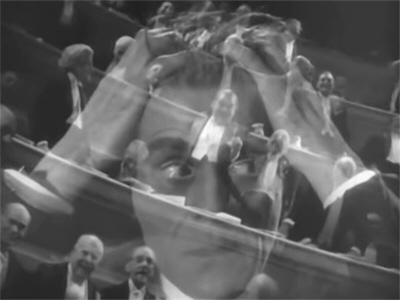
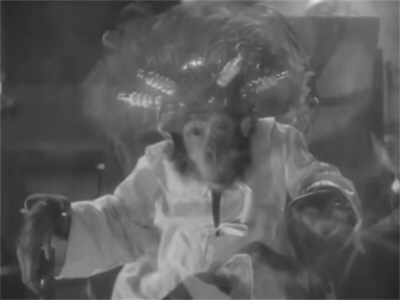
Laurience wakes up the new and improved "Lord Haslewood" outset. After inspecting his new body, Clayton advisedly lifts himself out of his chair—taking his first steps in many years. Meanwhile, Laurience retrieves "Clayton" from the 2nd compartment. He, conversely, stares down in horror at his twisted body and its confining chair, and cries out involuntarily. This attracts "Lord Haslewood", who reproves him, and asks that he treat his, Clayton'southward, body with more intendance, as, "A temporary tenant."
At this Laurience bursts out with his whole scheme: that Clayton should retain permanent possession of Lord Haslewood's torso, should become Lord Haslewood—and as such, go on funding his, Laurience's, research. Clayton is amenable to the idea; even when Laurience points out that he doesn't have to go on keeping "Clayton" live. At this "Clayton" utters a desperate protest, accusing Laurience of murder. He calmly agrees that it is non but murder, but the perfect murder: "Death by natural causes!"
"Thanks for the sound body," adds "Lord Haslewood".
"Clayton" stares upwardly at him, gives a burst of hysterical laughter—and dies.
This outcome suits both Laurience and "Lord Haslewood"—the former commenting darkly that since "mankind" has rejected him, he'll use his piece of work purely for his ain purposes, the latter discovering the many pleasant aspects of being a wealthy baron—press and otherwise; forth with a few annoyances like editorial meetings, at which his staff notice him adamant not merely to go supporting Laurience, simply to increase his funding; although he agrees that toning down the publicity might be a good thought. On other matters he is unwontedly indecisive…
Given Laurience's public downfall, Clare assumes that she'southward out of a job. She calls at the Institute once last time, as she supposes, to collect her things. She is started to find Laurience there, still in his evening clothes; and even more so to acquire he has convinced Lord Haslewood to give him a second chance.
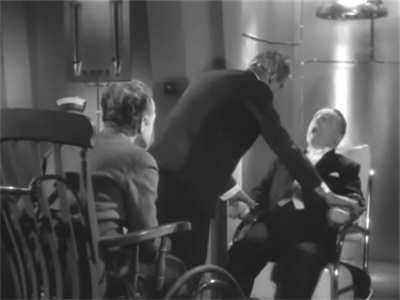
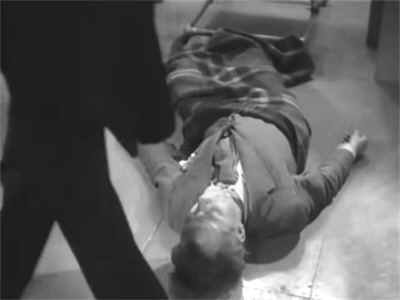
But this is nothing compared to her feelings when Laurience's speech about continuing his piece of work chop-chop morphs into a declaration of his want to do it all for her (thus sort-of justifying the tacky selling of The Human Who Lived Again equally the story of "a love-crazed scientist").
He misinterprets Clare's involuntary flinch away. "I understand: I'k old; but don't y'all run across? – with this new power, I needn't stay sometime!" he argues; adding that she, too can somewhen do good; both of them transferring their minds into new bodies, as it becomes necessary: "Eternal youth!"
Clare moves to the window, her instinct to telephone call for aid. Laurience pulls her back—and understands when he sees Dick downward below, pacing beside his automobile equally he waits. While he is coming to terms with this unwelcome discovery, Clare slips away. Having watched the couple drive abroad, a scowling Laurience wanders over to his experimental equipment—his brow clearing equally he contemplates one of the strapped chairs…
Clare, meanwhile, gives a non entirely authentic summation of her coming together with Laurience: "I told him I was going to marry you lot." This is news to Dick every bit well as the states: "You are?" he exclaims. "Yes, I think I am – at present," Clare adds, rather quelchingly.
That evening, Dick calls his male parent'southward deluxe dwelling to announce his engagement. His arrival happens to coincide with Laurience trying to persuade Lord Haslewood – distracted as he is by his own entry in Who'southward Who: "What a pompous ass I am!" – to summon him there.
At that place is an bad-mannered moment upon Dick's offset entrance, since his father doesn't know him from Adam. Dick, for his part, is surprised past his father's unusual ebullience, also by his offering of a cigar; reminding him that he'south a not-smoker. Lord Haslewood and then formally introduces him to Laurience, who tells Dick he knows all about him, "From my assistant." This gives Dick the chance to break his news. Lord Haslewood rolls an inquiring centre towards Laurience, who responds cheerfully that he thinks he and Clare will make a splendid couple: "You look as though you haven't had a day'south affliction in your life!" he comments approvingly.
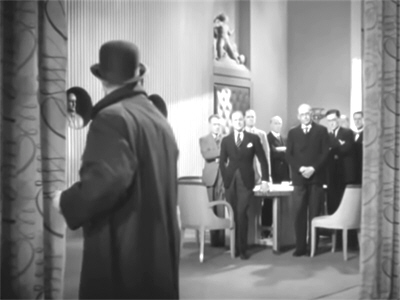
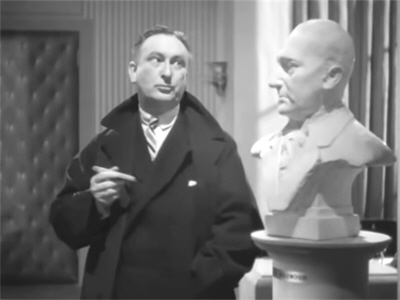
Left solitary with his male parent, Dick – who has already raised his eyebrows at Lord Haslewood's cigar – feels called upon to remonstrate when his father begins pouring out several fingers of whiskey. His remarks near the doctor convey nothing to Haslewood; but he is startled when Dick asks afterward his heart, and his medication. To his further dismay, he learns that even whiskey well-diluted with soda is off-limits to him.
Dick and then departs, giving Lord Haslewood time to absorb the implications of this conversation…
Calling upon Clare, Dick cannot help expressing his surprise at his male parent's positive attitude. Clare is at outset amused, until Dick's choice of words wipes the smile off her face:
Dick: "A alter? Why, he was a dissimilar person!"
Clare stares at him in alarm equally he recounts his warm reception from his usually distant father; her suspicions harden into certainty when she learns that Haslewood was showing a complete disregard of his doctor's orders, and that he and Laurience seemed, "As thick equally thieves." She breaks her date with Dick, though without telling him why, and rushes off to the Institute.
Laurience at first evades her questions, but when pushed he offers a half-truth: that Clayton offered himself equally an experimental subject, merely the stupor proved too much for him. Clare is entirely unpersuaded: she warns Laurience that, the next day, she intends to bring Dick and Lord Haslewood together and get to the bottom of things.
Laurience then returns to the Haslewood mansion, where he finds the lord of the manor in a very unlike mood from his earlier jocularity. "Do you remember how Haslewood laughed?" he demands, revealing to Laurience the bitter truth: that Lord Haslewood has a heart condition, which means he could driblet dead at any moment: "From the frying pan into the burn down!" he exclaims—enervating that Laurience do another experiment.
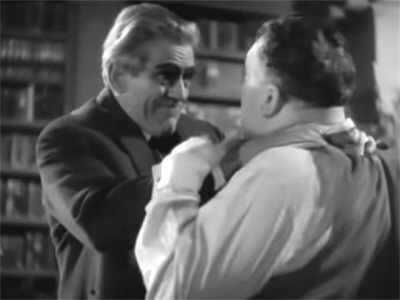
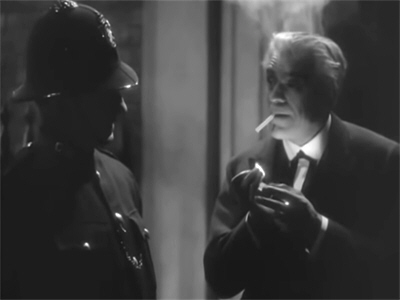
In fact—he wants Dick's body. He expounds upon his plan, in which equally Dick, he will inherit both the championship and the family fortune; Laurience can profit from the latter. They have only to go Dick to the Institute, and Laurience tin do the residue.
To which Laurience agrees…but once Haslewood has fabricated arrangements to run into Dick there, the scientist takes him by the pharynx and chokes the life out of him…
Laurience makes no attempt to cover upwardly his criminal offense; on the opposite, he draws as much attention to himself as possible, including speaking to a uniformed law officer exterior, and cartoon his attention to the time.
When Dick arrives at the Establish, he assumes that "the large story" his father mentioned on the phone has something to do with the new gadget he heard Laurience mention before; he, and we, larn that, given Clare's refusal to aid, Laurience has prepare himself to re-tool his equipment, so information technology tin can now be operated past ane person. Laurience continues his monologue until Dick has his back turned—and then presses a chloroform-soaked pad over his face up…
When Dick comes to, information technology is to detect himself strapped into one of Laurience's chairs. As he struggles in vain, Laurience gloats:
Laurience: "Don't yous see? I take your torso, your proper name – and Clare! You lot? – you take the body of a man the police will hang for murder!"
The nowadays obscurity of The Human being Who Changed His Listen is hard to account for; although I suspect its title woes may have something to do with it. Obviously the in-congenital pun in the film's original moniker was a bit subtle for its American distributors, who released it equally The Human Who Lived Again: an unimaginative choice that may well assistance confuse information technology with almost any other of Boris's mad-scientist films of the tardily 30s and early 40s. Worse nonetheless, at its various re-releases the film was lumbered with a series of other alternatives – The Brainsnatcher, Body Switch, and (heaven assistance us!) Dr Maniac – which probably contributed to its eventual slip through the cracks. (Annoyingly, it is almost incommunicable to detect any advertizement art using the film'south original championship.)
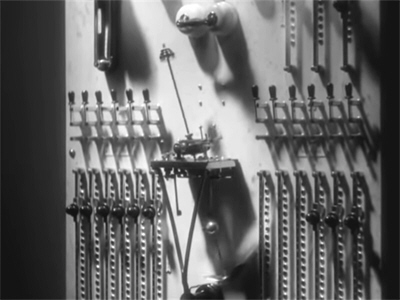
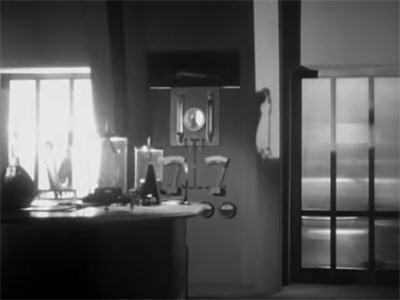
Yet in that location are plenty of signs that The Man Who Lived Once more was originally intended as something of a prestige production—not least that information technology emanated from Gainsborough, of all unlikely sources. Though this is very much a "Boris Karloff film", for once Boris wasn't left to conduct everything on his ain, but was instead given a quality supporting cast to work with. The flick was directed by Robert Stevenson (who was married to Anna Lee, to which nosotros may aspect the film'south overabundance of loving close-ups of its leading-lady), with cinematography past Jack Cox and production design – the latter 1 of its real strengths – by Alex Vetchinsky.
But it is the screenplay which is well-nigh responsible for the success of The Man Who Changed His Heed. Here we detect three familiar names: L. du Garde Peach, who as well worked on Karloff'southward kickoff British horror film, The Ghoul, as well contributing to The Tunnel; John Balderston, who wrote the screenplay of The Mummy, in improver to his script-doctoring of Dracula and Frankenstein; and, peradventure well-nigh significantly, Sidney Gilliat.
Information technology was likely the latter who was responsible for this motion picture'due south careful balancing of its horror and humor: as his afterward partnership with Frank Wash would illustrate, Gilliat was a principal of using one-act to heighten, rather than to misemploy, suspense. Nosotros meet this in The Man Who Changed His Listen, which is a moving-picture show that walks a difficult tightrope—treating its baroque central premise quite seriously, yet offering plenty of humour as well, without ever straying into the realm of the "horror-comedy". Information technology also manages a genuinely complex and tightly-knitted plot in spite of its brief-running-fourth dimension; and so much so that a second viewing may exist necessary in order to appreciate fully just how cleverly structured and genuinely witty this moving picture is.
Still—with only just over an hour to piece of work with, something had to give; and virtually unfortunately (at least from my indicate of view) it gave with respect to its heroine. That second viewing, if non the outset, brings to light the dismaying reality that for all of Clare Wyatt's professional qualifications, she doesn't actually become to do whatever scientific discipline at all! Overall we see more of her every bit a surgeon than as a scientist—and washing coffee-pots more than either.
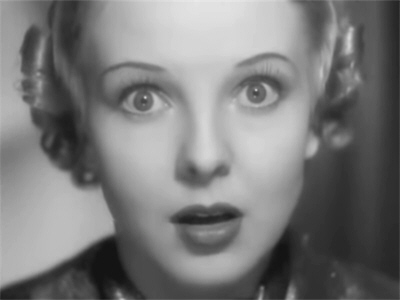
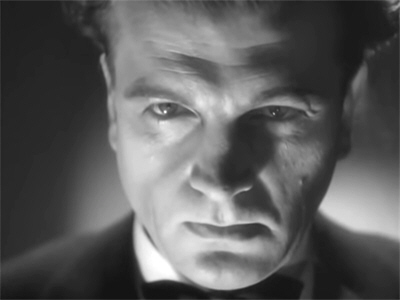
The more than we think about, the more information technology becomes evident that Dr Laurience never actually needed an banana at all. Laurience himself finally assigns quite a different motive to his sending for Clare; while in plot terms, it is not her scientific expertise that matters, simply her position as catalyst, bringing Laurience and the Haslewoods together.
But while this is a distinct bummer, all is not lost with respect to Clare. The picture ultimately comes downwardly on her side in all of its gender games—including a delicious chip of role-reversal at its climax, which finds Clare rushing to the rescue of the imperilled Dick. We might also care to note that while Clare is presented as genuinely dedicated to her profession(s), Dick is shown every bit merely playing at his work, while he schemes to get married. There's not much question here as to who is the stronger personality; and information technology isn't hard to imagine Clare putting her foot down about her piece of work even afterward she and Dick take the plunge. I for ane await forrard to the day when Lady Haslewood takes over the running of the Haslewood Institute…
But though she makes a fine leading-lady, Anna Lee is somewhat disadvantaged by being outside the outrageous personality switches that dominate the 2d one-half of The Human being Who Inverse His Listen. The film becomes a great gift to its male cast-members, each of whom is given the risk to, in result, play a dual role; at to the lowest degree a dual role.
The climactic sequence, which finds Boris Karloff playing John Loder playing Dick Haslewood, and John Loder playing Boris Karloff playing Dr Laurience, is marvellous; but even this is overshadowed past the outrageous plot-manoeuvring which finally gives us Frank Cellier playing Donald Calthrop playing Clayton playing Lord Haslewood. In fact, Cellier pretty much steals the film hither: the scenes which observe Clayton in his new body adjusting to the advantages and disadvantages of being Lord Haslewood are wonderfully funny—and vitally, are so in a manner completely organic to the plot.
Throw these into the mix with some batty science and an even battier scientist, some well-deserved satire of the Fourth Estate, and a immature couple in the process of taking their era's gender stereotypes and turning them inside-out, and the event is tiny gem of a film that deserves to be much better known.
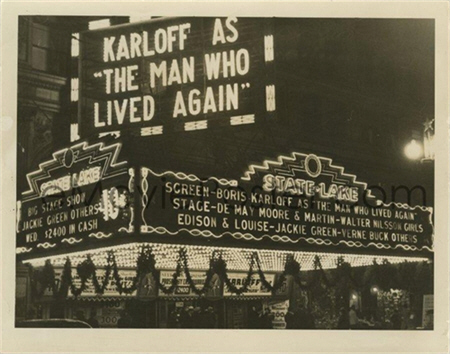
Click hither for some Immortal Dialogue!
♦♦♦♦♦♦♦♦♦♦♦♦♦♦♦♦♦♦♦♦♦♦♦♦♦♦♦♦♦♦♦♦♦♦♦♦♦♦♦♦♦♦♦♦♦♦♦♦♦♦♦♦♦♦♦♦♦♦♦♦♦

This review is for Office i of the B-Masters' 20th anniversary celebration!
Source: https://andyoucallyourselfascientist.com/2019/02/26/the-man-who-changed-his-mind-1936/
0 Response to "The Man Who Lived Again 1936"
Postar um comentário